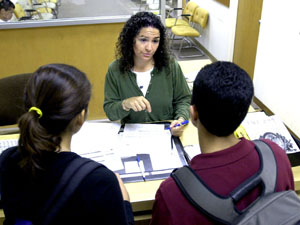|
HOME | SEARCH | ARCHIVE |
|
113 Campbell Hall: First stop for many entering freshmen
![]()
By Diane Ainsworth, Public Affairs
| |  College of Letters and Science adviser Nancy Finkle assists students during drop-in hours. Noah Berger photo |
16 August 2001
|
Campbell Hall 113 is an office that many undergraduates find in no time flat. Through the heavy glass doors, just off to the right of the corridor, is the Office of Undergraduate Advising for the College of Letters and Science, where class schedules are decided, majors are declared and futures are born. It’s arguably one of the busiest offices on campus the first day of class. Even with 23 academic advisers on hand to furnish information and advice, the job of answering all of the questions flying across the counter, over the phone, or through the Internet is rarely accomplished in a day’s time. The College of Letters and Science Undergraduate Advising Office helps
students navigate the maze of requirements for an undergraduates, says
Nancy Finkle, one of the academic advisers. From planning a semester’s
schedule to scouting for a challenging internship, the office provides
a broad range of informational, referral and academically focused services.
Satellite advising is offered in the Unit III residence hall one evening
a week for those who have trouble scheduling appointments. Additionally,
the office will help students get through roadblocks, like with financial
aid or registering for classes, family issues, registration blocks and
other aspects of university life.
Letters and Science advisers assist hundreds of students by phone, e-mail or in person, on a single shift during the first week. The work is demanding, the pace hectic, but for this cadre of professional advisers, it’s a unique opportunity. “We are working with the brightest kids,” says Finkle, who holds a master’s degree in international education from American University in Washington, D.C. “And the work is different every day. The students bring me a slice of life every day, in the challenges they face and the dreams they dream. In some little way, if I can help push them along or find a door to help them knock on, then I’ve accomplished something.” The office is designed to make the university a friendly, more personal environment by offering students the opportunity to work one-on-one with advisers on their academic and career goals. Issues such as academic exploration, selecting courses, choosing and declaring a major and, in the later years, identifying a career interest are among the topics most often tackled.
“I enjoy making a big school feel smaller,” says Mary Slakey, who has
a degree in social welfare. “I’ve had experience in counseling and management,
but I really enjoy working with students and this part of their developmental
life. They’re at a point where they’re learning to make good, sound decisions
about their lives and there’s so much here for them to take advantage
of.”
“If they’re looking for more detailed information about specific career
fields, we’ll refer them on to the Tang Center, which houses University
Student Health Services, where they have a variety of counseling programs,”
she says. “Or we’ll send them on to the Career Center if they are after
specialized career counseling.” Career aptitude and personality interest
testing, such as the Meyers-Briggs and Strong Interest tests, is available
through these student services.
Transfer students make regular use of the advising office. Those aged
18 to 22 years old seem “a bit more shy and more fearful of asking questions,”
Finkle says, whereas the transfer students, who are often 25 years and
older, are not as embarrassed to inquire about services or seek help if
they are in academic trouble.
“The most important advice we can impart to students is not to wait until
it’s too late to get help with their classes,” Finkle says. “This is a
place where they can go and talk about the problems they are having, where
they won’t be judged or criticized. We will offer them referrals and guidance.”
If networking or social isolation is at the core of a student’s problems,
counselors will facilitate successful connections with peers, staff, faculty,
alumni and other members of the university community and the community
at large. Students requiring more in-depth counseling are referred to
the Student Health Services’ Counseling and Psychological Services. “Usually, we’re pretty busy the first three weeks of the semester, because
a lot of students ask for help with registration, using Tele-BEARS and
getting their financial aid, fee waivers and deferments taken care of,”
she says. “The eighth week is also busy, because that’s the deadline for
adding and dropping classes and changing grading options. And then they
can drop classes with a notation through the last week of classes, the
15th week, so we get a lot of last-minute business at the end of the semester
too.”
“The first week is absolutely the worst,” says Winnie Au, an advising assistant. “The phones ring nonstop, the students are here all day long, the e-mail is unbelievable.” But it’s all in a day’s work, and after 13 years of manning the Academic Advising counter, she’s used to the crush of students on opening day.
This year is no exception. A total of 3,775 freshmen make up the fall entering class of undergraduates, along with 1,775 transfer students. As the largest of the colleges, Letters and Science is home to 76 percent of the undergraduates, many of whom will be wending their way across campus, looking for ways to switch classes, add or drop courses or file paperwork for financial aid.
The busiest times of the year for academic advisers fall in the first,
eighth and last weeks of the semester, Slakey says.
Home | Search | Archive | About | Contact | More News
Copyright 2000, The Regents of the University of California.
Produced and maintained by the Office of Public Affairs at UC Berkeley.
Comments? E-mail berkeleyan@pa.urel.berkeley.edu.